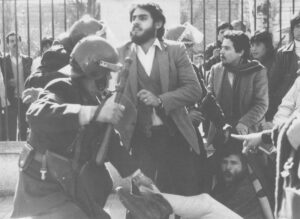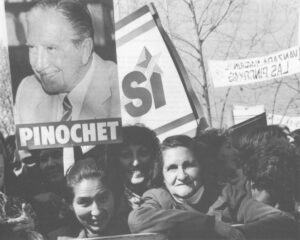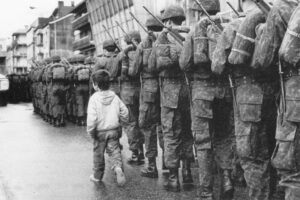We were the generation that thought we had the world in our hands. We were building a new country, and we gave our all to the cause. We lived and felt intensely, every moment.
Estela Ortiz, 39, a communist youth activist during the socialist government of Salvador Allende (1970-73).
Our cause was to rebuild the country, to overcome poverty, to create a modern economy. We earned terrible salaries but there was much mystique. We were making a revolution.
Christian Larroulet, 38, an economic planner for the military regime of Gen. Augusto Pinochet (1973-present).
Their words are startlingly similar, their ages almost identical, their houses a few miles apart. But these two Chileans live in worlds that have never touched. They represent two sides of a generation that was convulsed by an ideological struggle and permanently marked by the military coup of September 11, 1973.
Ortiz was on the losing side: her youthful dreams of a socialist revolution were crushed by the coup and her family shattered by repression. In 1976 her father, a lifelong communist, was seized by security forces and never seen again. In 1985 her husband, a human rights activist and also a party member, was kidnapped and found with his throat slit beside a highway. Since then Ortiz has been a constant figure at human rights protests and cemetery homages, always carrying a red carnation that symbolizes her ideological commitment.
Larroulet was on the winning side: a member of the conservative student movement that was thrust into prominence by the coup. These sharp young law and economics students were appointed as campus leaders by military authorities and then recruited into the military regime, helping to form the team of technocrats, administrators and ideologues that built Pinochet’s counter-revolution. Larroulet entered public service in 1975 and resigned recently to assist the presidential bid of his mentor, former Finance Minister Hernan Buchi.
More than 3.7 million Chileans were between the ages of 15 and 30 when the coup came; today they are in their peak years of potential contribution to society. But how many adapted to life or even flourished under military rule? How many disciples of Allende clung vainly to their ideals, or drifted in mental or physical exile? Now that Chile is preparing to return to democracy, can the children of revolution debate the whiz kids of the dictatorship, and agree to disagree after so many years of mutual hatred and fear?
And what of the generation that succeeded them–the youths who grew up under a system that enforced conformity and obedience to authority? From the beginning, Pinochet vowed to purge “Marxist vices” from the young and build a new breed of morally upright, apolitical professionals and workers. Through a combination of repression and legal reform, the regime strove to tranquilize college campuses and replace a generation of Estela Ortizes with a generation of Christian Larroulets. In 1983, when student protests erupted across the nation, their scheme appeared to have failed. But has it?
The story of Chile’s revolutionary “lost generation” has a quality of inevitable tragedy. Swept up in the passions generated by the Cuban revolution and inspired by Allende’s vision of peaceful socialist transformation, young Chileans spread the gospel of land reform to tenant farmers, encouraged metal workers to take over factories, and stayed up until dawn listening to Andean protest ballads and debating the finer points of Marcuse and Mao. Some joined armed insurrectionary groups like the MIR (Movement of the Revolutionary Left) and called for an uprising of the masses.
There were demons of ambition and fanaticism lurking in this fiery euphoria, and powerful enemies afoot: the propertied classes that feared the “rabble” would take over, the army that saw civilian rule collapsing in impotence against a Marxist menace, the interests of American power-brokers. But the brash young rebels pushed on, daring the establishment to call their bluff, threatening to storm the barricades of capitalism with armies they did not possess, demanding ever-more radical changes in a spiral of violent rhetoric.
“People believed paradise was around the corner. There was an explosion of passion, a drunken binge of ideas and a constant demand for political definitions. We all thought we were at the Sorbonne; we expected to find Che Guevara in the next cafe,” recalled Marco Antonio dc la Parra, a psychiatrist and playwright who was a pre-medical student at the time. “But there was also a sense of violence in the air, a feeling that it would all come crashing down. We suffered the cruel and calamitous impact of a utopian time.”
The coup struck Chile’s radical youth with merciless force. Within hours Allende was dead in his smoldering palace and army troops were sweeping from house to house. Young revolutionaries who dreamed of commanding liberated factories found themselves imprisoned in sports stadiums. A few armed groups such as the MIR vowed to resist but were quickly overwhelmed. Soon a secret police apparatus was in operation, dragging hundreds of young activists off to face imprisonment and torture. At least 700 prisoners were never seen or heard from again.
Mariela Bacciarini, a 15-year-old leftist militant, was seized just before the coup and thrown into a damp cell at Tejas Verdes, a notorious military camp. “I heard my friend screaming for her mother, and then I knew the rumors were true,” recalled the slender, nervous woman of 30, who was sentenced to two years in prison by a secret war council. “When my turn came, they tied me naked to a metal bed and turned on a machine. I felt horrible pains on my tongue, in my vagina. Far away, I heard the sound of a piano playing.”
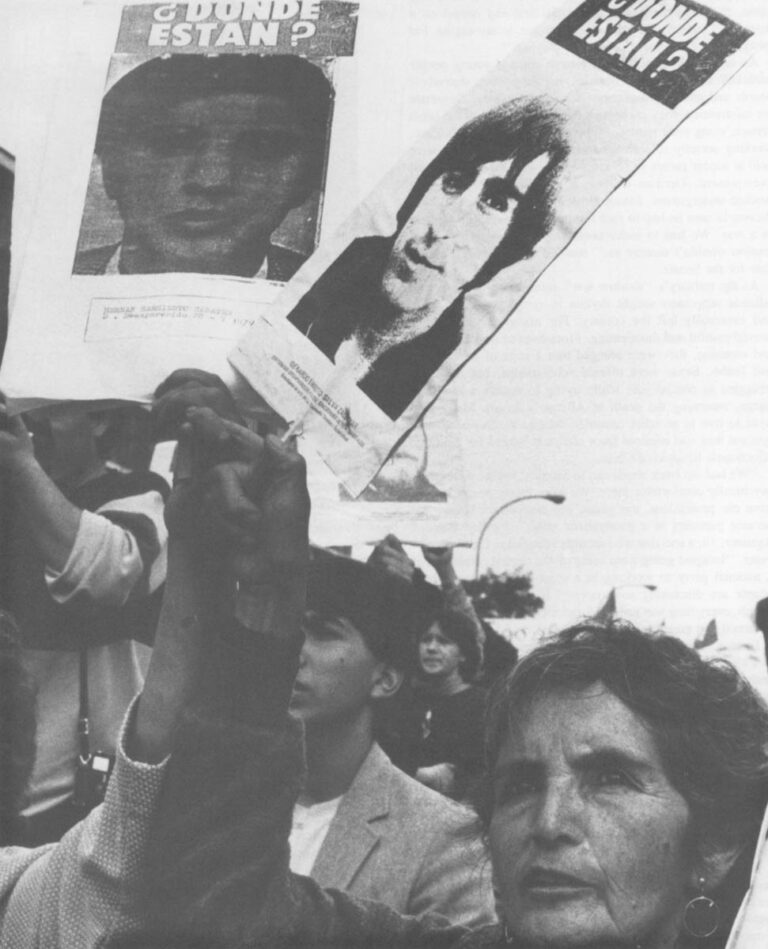
As tales of kidnappings and torture spread, young people panicked. People emptied libraries, burned posters, shaved off beards and exchanged ponchos for sports jackets. Desperate for information, they exchanged telephone reports of the latest arrests, using code names. Some tried to keep the left alive working secretly to maintain party contacts. Meetings were held at soccer games or on long walks, with the risk of arrest ever-present. German Correa, a socialist in his 20s who worked underground, forced himself to forget names and addresses in case he had to face torture. “We were like soldiers in a war. We had to make ourselves numb so the pain and tension wouldn’t destroy us,” recalled Correa, now a candidate for the Senate.
As the military’s “shadow war” intensified, thousands of Allende supporters sought asylum in sympathetic embassies and eventually left the country. For many, the experience proved painful and disorienting. From lives of intense activity and meaning, they were plunged into a state of dependency and limbo. Some were offered scholarships, but most struggled in menial jobs while trying to master a new language, mourning the death of Allende’s dream. Many who went to live in socialist countries became disillusioned with systems they had admired from afar, and longed for the more affectionate lifestyle of Chile.
“We had our basic needs met in Sweden, but we were never psychically comfortable there. We were young people cut off from our professions, our plans, our purpose for being. We became parasites in a paternalistic state,” recalled Soledad Ramirez, 38, a socialist who recently returned to Chile after 14 years. “Imagine going from being on the central committee of a national party to working in a meatpacking plant where people are discussing soap operas! It was like being in a womb, everything was provided, but there was no spontaneity. I learned that paradise is never perfect.”
Even at home, Popular Unity supporters found themselves in a kind of exile. From a fever pitch of meetings, rallies and brainstorming sessions, Chile became an orderly, silent society in which everyone kept his thoughts to himself. Cafe life vanished; radio stations were forbidden from playing Andean protest ballads; philosophy professors found themselves driving taxis to feed their families. Some leftists nursed the vague hope that civilian rule would return; others mourned for lost illusions and agonized over why their perfect revolution had fallen apart. “It was like the death of a son; there was the sensation of a world ending. People fell into terrible depressions,” recalled Manuel Antonio Garreton, a young socialist academic who was dismissed from the Catholic University.
Repression was especially harsh in universities, which had become meccas of revolutionary thought and activism since the late 1960s. Military officials were appointed as university rectors and given wide, arbitrary powers. In the ideological purge that followed, about 18,000 teachers, staff and students were dismissed across the nation. Departments dealing with topics from sociology to Slavic languages were shut down; thousands of social science books were destroyed in bonfires. Faculty members were instructed to confine themselves to texts and make no comments on current events.
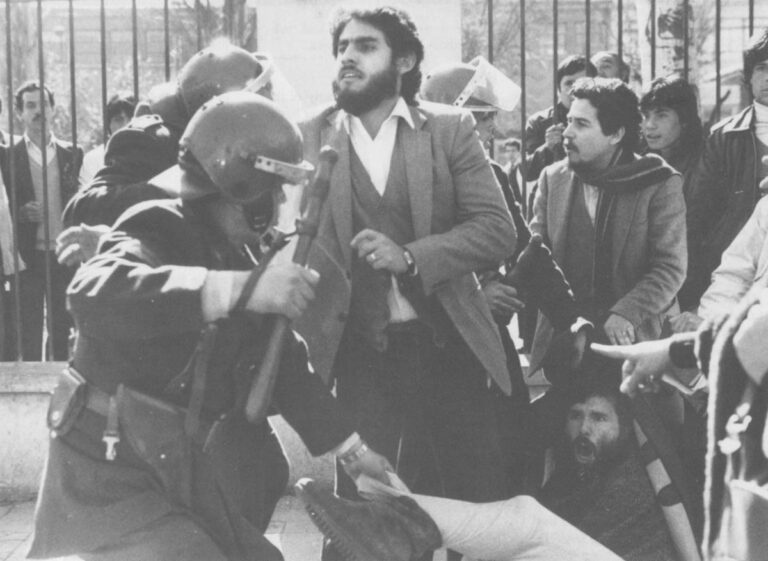
Locked out of the universities, Popular Unity academics tried to keep intellectual alternatives alive by founding a number of small, private research centers. Their cramped, chilly quarters soon became havens for expelled professors, their libraries preserved important bodies of work in fields no longer officially taught, and their associates produced regular critical analyses of military rule. These “shadow universities” also provided a place for reflecting on past mistakes and contributed to the “renovation” of Chilean socialism.
Outside these niches of resistance, however, life was changing drastically for Chile’s college students. Determined to enforce proper behavior, authorities suspended all student organizations and appointed conservative class leaders. Male students were ordered to cut off their hair and women to wear skirts. Beyond suppressing subversion, the regime sought to inculcate new youth values which would lead to a “profound change in the mentality of the country.” Competition and efficiency were stressed, and education was to be regarded not as a public benefit, but as an investment in “human capital.”
For a certain breed of student, the strict campus regime provided a privileged platform. These were the gremialists; the conservative, mostly affluent students who saw themselves as enlightened, apolitical ideologues with an avocation for public service, a strong rejection of Marxism, and a scientific approach to problem-solving. Their movement had been launched at the Catholic University before the coup and its influence spread rapidly afterwards, with authorities recruiting members then into the pro-regime youth movement.
“I had become disillusioned with the Popular Unity because there was no link between their rhetoric and actions. The gremialists seemed to have a sincere commitment to real values. It was a cause, a service, a style,” recounted Andres Chadwick, 33, a former gremialist student leader. From college, many of these bright young men moved directly into government think tanks or agencies, where they became the technocratic troops of a campaign to reorder Chile’s economic, social and political agenda. If human rights abuses were occurring in darker corners of the regime, they seemed far removed from the rarified, fast-moving world of these young wizards.
For students with any degree of rebellious spirit, however, the early years of military rule were bleak and frightening. Men in military haircuts appeared in classrooms unannounced, students were expected to listen without questioning, and the only dissent was expressed in unsigned slogans on bathroom walls. “It was a shock to find yourself suffocated in a place you had expected to be full of people and ideas,” said Yerko Ljubetic, 29, who entered the University of Chile in 1978. “All political discussion was avoided, and you had to slowly reweave a fabric of trust through simple things like chess and guitar.”
While military authorities were certain they wanted to change Chile’s educational values, it took them a number of years to decide how to go about it. Finally in 1980, the regime announced a policy of sweeping “modernizations” aimed at scaling back the public university system, stimulating competition among new private colleges, replacing free tuition with paid credits, and insulating academic training from political debate. Never again would campuses be placed at the service of “ideologizing experiments,” declared the Interior Minister.
While these policies were still under study, however, the first stirrings of campus protest began. Initially, the “rebellion” took the form of poetry readings and seminars; then came the battle to replace designated campus leaders with elected ones. By 1981, students were staging strikes to protest the new university policies. Participants were expelled and ringleaders arrested, but the movement kept gathering force. In 1983, students spearheaded national protests against military repression and economic hardship. Riot police responded with tear gas and water cannons, but the Pinochet regime was forced to permit some political reforms and never regained total dominance over the populace.
“It was a very emotional time. People were very afraid, but if we had stopped to think how great the danger was, we never could have gone on,” recalled Ljubetic, a soft-spoken Christian Democrat who led the protest movement at the University of Chile. “We were all sons of dictatorship, but our democratic avocation was stronger,” he said. “We became an unstoppable motor. Overnight, Chile went from silence to an effervescent display of discontent.”
Outside the universities, another, more ominous kind of youth movement was growing. Hundreds of teenagers in poor neighborhoods, with few career prospects and deep resentment against the regime, were recruited into clandestine revolutionary “militias” such as the Manuel Rodriguez Patriotic Front, taking part in hundreds of dynamite bombings against government facilities. To the regime, they were “delinquent extremists” bent on destroying public order. But in many shantytowns, they were heroes, and their exploits were made legend by clandestine art brigades whose murals covered apartment complex walls.
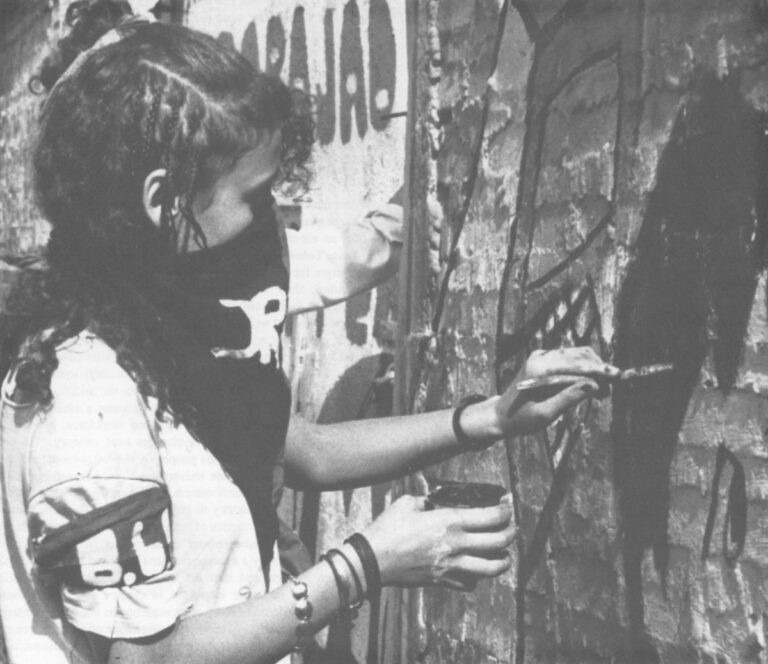
Eduardo and Rafael Vergara, teen-aged sons of a Catholic activist couple in working-class Pudahuel, joined the Movement of the Revolutionary Left in the early 1980s and were shot dead by police in 1985. Their younger brother Pablo went underground and was killed in 1988 while allegedly blowing up an electrical tower. In a recent interview, their mother, Luisa Toledo, described the boys as “community leaders” and martyrs for the cause of justice. “They weren’t crazy or hotheaded, they were committed to struggling against dictatorship,” she said. “Their lives and deaths were symbols of hope for all of us.”
If prolonged military rule failed to quell youthful unrest, it did succeed in radically altering Chile’s higher education system, making it more competitive and financially sound. Critics charge that by eliminating free tuition for the middle-class, the regime has divided the population between a small, “command elite” and large, less educated workforce. But even critics now agree some of the changes were salutary. “Today you won’t find any serious people on the left who defend the old tradition of free state universities,” said sociologist Jose Joaquin Bruner, himself once a revolutionary student leader.
Aside from a minority of politically active students, moreover, the regime’s tactics of intimidation and persuasion have produced a profound impact on the views of the post-coup generation. Today’s average students, exposed to the world of foreign imports and shut off from the world of democratic debate, are far more interested in clothes and careers than politics. While polls show most students do not favor military rule, it has made them apathetic, suspicious of ideology, uninclined to take risks and not entirely sure what democracy means.
“These kids are consumers of education, and I am providing a service to help their careers,” explained Flavio Cortes, a sociology instructor at Diego Portales University. A Christian Democrat who survived the university purges, he often attempts to spark classroom debate on topics such as power or civil rights, but draws little response. “I have many friends who were tortured, but this generation simply wouldn’t relate to it,” he said in discouragement.
The new conservative elite is not necessarily antidemocratic. Younger gremialista leaders like Jose Antonio Silva, the 22-year-old president of the Catholic University student federation, are eager to distance themselves from the Pinochet era. “The values of the regime were good, but there was an excess of dogmatism. Instead of rebuilding the universities, they asphyxiated them,” Silva observed.
If campus life has changed, the world Chile’s college graduates enter today bears equally little resemblance to the fervent, soul-searching days of Popular Unity. Santiago has become a city of computers and credit cards, yogurt and yoga. Political discourse has shifted to the right; enterprise has replaced ideology as the national pastime; and the only presidential candidate with any youth appeal is Buchi, a 40-year-old engineer and jogging addict who has been promoted by ultraconservative business interests.
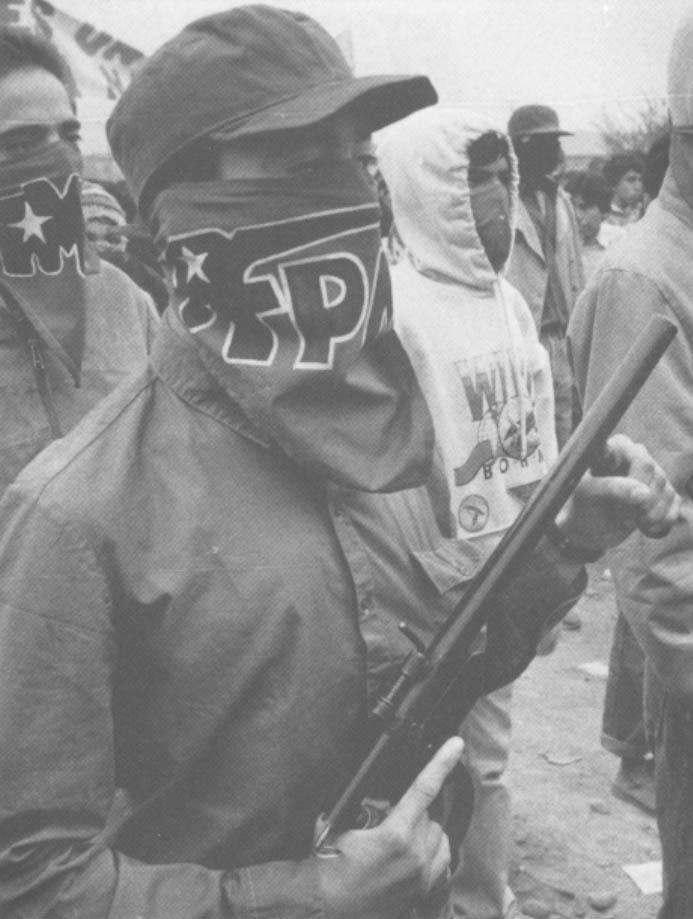
Perhaps the prototypical new Chilean is Maximo Pacheco, Jr., an energetic business executive of about 35. Fifteen years ago, he was a fervent campus Marxist; today he manages a successful capital leasing corporation whose offices hum with Fax machines and conference calls. “I was always a man of action. I like to achieve things, and in this era the clear challenge is to become part of the modernizing force,” he explained. “More and more I believe that business leaders are the true motor of development. The world has changed, Chile is a new country, and we want to be on the frontier.”
Not all members of Chile’s “lost generation” have made this transition so smoothly. The adjustment has been especially hard for returning exiles, who barely recognize the society they fled in the mid-1970s. Some have withdrawn into themselves, unable to share their history of hardships with old friends or new colleagues; others have clung to the protective circle of human rights groups. A number have moved into mainstream politics, but have found many opposition posts have been filled by older politicians who waited 15 years to resume truncated careers. In some ways, the Allende generation has lost its chance forever, and many true believers have found themselves slipping into older, wiser and more pragmatic attitudes.
“The Pinochet regime wasn’t like the Inquisition, but it changed us all in much more subtle, perverse ways,” observed one former MIR member who spent many years in Europe and has now returned to Chile as a software analyst. “You cannot remain a mental exile forever, thinking 20-year-old thoughts. You have to integrate back into your surroundings. Whether you realize it or not, you adapt.”
©1989 Pamela Constable
Pamela Constable, on leave from the Boston Globe, is examining the impact of Pinochet’s dictatorship on Chile.

